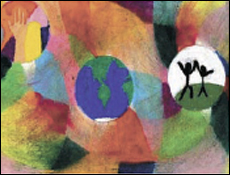Evaluating a K-12 Philanthropy Curriculum: Learning to Give
- Diane L. Zimmerman
- National Collaborative for the Study of University Engagement
- University Outreach and Engagement
- Robert Floden
- Institute for Research on Teaching and Learning
- College of Education

Drawing by Learning to Give student
Learning to Give (LTG) is an innovative educational initiative that seeks to pass on the traditions of a civil society to the next generation by infusing academic content about philanthropy into the core curriculum of schools. With funding from the Council of Michigan Foundations, an interdisciplinary MSU team is working with the LTG staff and steering board to evaluate the program.
"My students were finally able to make a connection to what we were doing in the classroom and their local community. Many of them for the first time in their lives had the feeling that they were a valued member of the community."
LTG teacher
LTG employs a comprehensive set of strategies—curriculum development, in-service teacher training, pilot testing, and Web-based dissemination. Results from the evaluation research over nine years indicate that the program has helped teachers to transform their roles. It is also giving K-12 students a solid foundation in the basic concepts of philanthropy and the common good. LTG students participate in voluntary service to their community at a rate of involvement almost twice that of most school children.
The MSU team began working with the project as formative evaluators when it was just beginning. The LTG staff and steering board found the collaboration so useful that they expanded the contract to include outcomes evaluation and test development. This longevity and expansion of goals is evidence of the value placed on MSU's role in the success of the project.
The evaluation partnership also received academic notice when it was named as an "Exemplar" of outreach research by the national Committee on Institutional Cooperation's Committee on Engagement.
Originally Michigan-based, the LTG project started moving toward a national roll-out in 2005.
- Written by Linda Chapel Jackson, University Outreach and Engagement